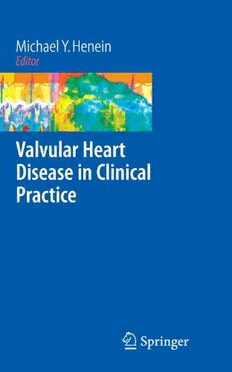
Valvular Heart Disease in Clinical Practice PDF
306 Pages·2009·8.649 MB·English
Most books are stored in the elastic cloud where traffic is expensive. For this reason, we have a limit on daily download.
Preview Valvular Heart Disease in Clinical Practice
Description:
Major advances in the management of heart valve diseases have occurred in the past three decades. Doppler echocardiography has become the cornerstone for accurate assessment of valve disease, even allowing identification of disease progression. Surgical treatment of valve disease has also witnessed great advances, having moved from traditional valve replacement to sophisticated repair procedures, with robotic cardiac surgery also showing promising results. Furthermore, in special circumstances, with conventional surgical valve excision has now been being replaced by percutaneous catheter-based valve replacement for aortic and pulmonary disease. This approach reduces the risk from the surgery itself, avoids general anesthesia and many potential postoperative complications.Valvular Heart Disease in Clinical Practice includes chapters from a distinguished panel of contributors looking at the practicalities of diagnosing and treating common heart valve diseases and covering all of the standard clinical and surgical issues. It is designed to assist in the management of patients with valve disease and provide cardiologists, cardiac surgeons, intensivists, and emergency medicine physicians with answers to the clinical questions that arise in their practice.
See more
The list of books you might like
Most books are stored in the elastic cloud where traffic is expensive. For this reason, we have a limit on daily download.
